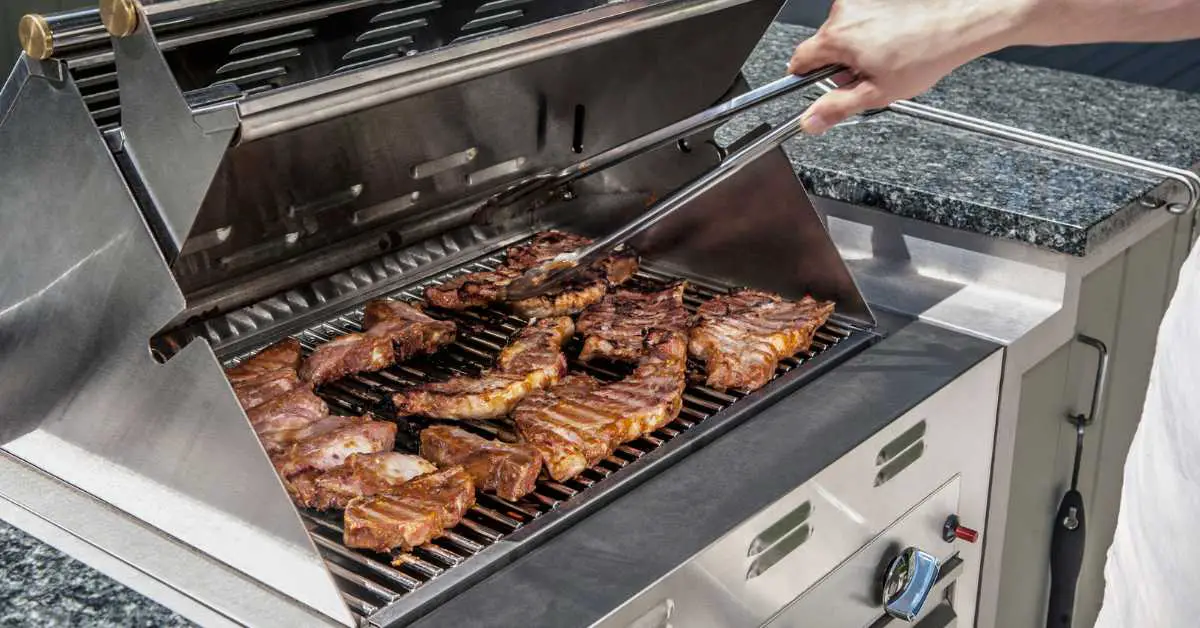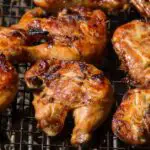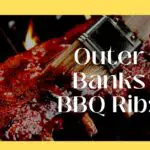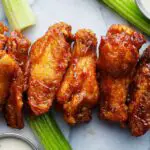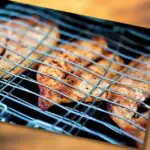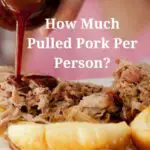Have you ever asked yourself, “How long does a propane tank last on my grill?” You’re not alone. This question is a common one, especially for those who love their outdoor BBQ sessions.
The simple answer is you can expect to get 10 hours of cooking per 20lb propane gas tank.
There’s a lot of math involved for a more detailed answer and it really depends on the size of the grill and your cooking style.
Smaller grills with fewer burners can get close to 17 hours of cooking time, while larger grills will be in the 7 – 8 hours range.
There are a lot of other topics to cover, so let’s dive in. By the end of this article, you’ll be able to hold a trivia contest during your next backyard BBQ!
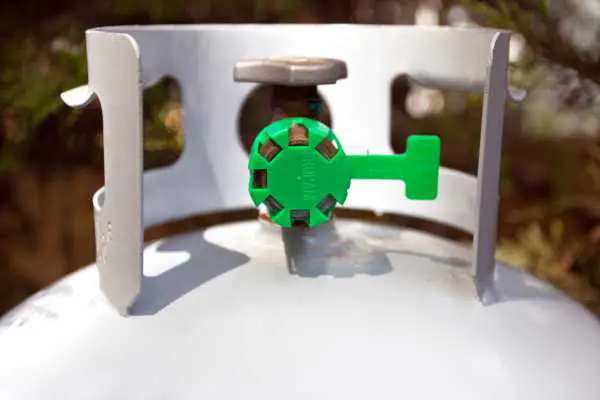
So, how long does a propane tank last?
The answer isn’t quite as simple as we’d like, and it depends on a couple of key factors. These are the size of your propane tank and the BTU rating of your grill.
Let’s start with the tank size. Most backyard grills use a standard 20-pound propane tank. When full, this tank contains about 4.7 gallons of liquid propane.
The average grill propane tank is a 20-pound tank. There are rated to provide 22,000 BTUs per pound.
With some back-of-the-napkin math, we end up with 440,000 BTUs available. We get that by multiplying 20 lbs * 22000 BTUs per pound.
Now that we have the total BTUs available – 440,000 – divide it by the BTU rating of your burners. If you have a grill with (2) 12000 BTU burners, that is 24000 BTUs in total when you are cooking.
So, 444,000 /24000 gives us 18.33 hours of cooking time.
➡️ You may also be interested in learning how long to grill chicken at 350°F
Understanding BTUs
BTU stands for British Thermal Unit, and it’s the measure of how much heat your grill can produce. You’ll usually find the BTU rating in your grill’s manual or printed on the grill itself.
Think of BTUs as the speed at which your grill eats up the propane. The higher the BTU rating, the faster your grill will use up the propane.
Take the Guesswork Out of Grilling!
Dozyant Propane Gas Gauge

Your steaks are sizzling, your veggies are grilling, and just when the aroma gets tantalizing, your grill runs out of gas.
Annoying, isn’t it?
With DOZYANT Propane Tank Gauge Level Indicator, you’ll always know how much gas you have left.
It’s like having a sixth sense for your grill—no more guessing, no more surprises, no tools required, just perfect grilling every time.
Example of Gas Grill and BTUs
In this example, we are looking at a popular mid-range gas grill, the American Gourmet Classic 360 3-Burner Gas Grill.

When you dive into the specs <see below>, you can see that it burns at a rate of 30,000 BTUs.

So, let’s use our simple equation to see how long we can cook on a single tank. Assuming a 20 lb tank is used, [440,000 / 30,000 = 14.66] or 14.6 hours of cooking time. Pretty simple, right?
Propane is a versatile and efficient fuel source loved by grill enthusiasts everywhere. Its popularity stems from its ability to provide consistent, easily controlled heat, making it ideal for grilling. Throughout this article, we’ll delve into the lifespan of a propane tank and cover essential aspects of propane usage for grilling.
What You Need to Know About lb Propane Tanks
An lb propane tank refers to the weight of the tank when full of propane. These tanks come in various sizes, including 20, 30, and 40 pounds. Understanding the weight of your propane tank is key to estimating its lifespan and usage.
Small Propane Tanks: A Portable Option
Small propane tanks, such as the 1-pound Coleman tanks, are excellent for portable grills or camping trips. Despite their size, these tanks can provide a few hours of grilling time. They offer convenience and portability, although they don’t last as long as their larger counterparts.
Understanding the 20-Pound Propane Tank
The 20-pound propane tank is a common choice for home grilling. On average, such a tank can last between 10 to 20 hours, depending on the size of your grill and how intensely it’s used. This tank size strikes a balance between longevity and portability, making it a popular choice among homeowners.
What a Gallon of Propane Means for Grilling
Each gallon of propane contains about 91,500 British Thermal Units (BTUs) of energy. Understanding this figure can help you calculate how much fuel your grilling sessions will require. A gallon of propane typically provides several hours of grilling time, but this can vary depending on your specific grill and usage patterns.
Gas Stations: A Convenient Propane Source
Many gas stations offer propane refills or exchanges, making them a convenient source of fuel for your grill. These locations can be a lifesaver when you run out of propane in the middle of a cookout. Just remember to check the tare weight and expiration date before purchasing a new tank.
Grilling on High Heat: How it Affects Propane Usage
Grilling on high heat uses more propane than cooking at lower temperatures. This means that if you’re planning to sear steaks or cook other high-heat dishes, you’ll need to factor in the increased propane usage. It’s always a good idea to have extra propane on hand if you plan on using high-heat methods.
Propane Tanks and Expiration Dates
Every propane tank comes with an expiration date, usually 12 years from the date of manufacture. It’s crucial to check this date and ensure your tank is still in good condition before using it. Expired tanks can be unsafe and should be recycled or exchanged at a certified propane dealer.
The Role of Propane in Water Heaters
Propane isn’t just for grilling – it’s also a common fuel source for water heaters. These appliances use propane efficiently, but they can consume a 20-pound tank fairly quickly depending on usage. Always monitor your propane level if you’re using it for multiple appliances.
Understanding Burn Rate in Propane Grills
The burn rate refers to how much propane your grill consumes per hour. Grills with high BTU ratings have higher burn rates and thus use up propane more quickly. Knowing your grill’s burn rate can help you estimate how much gas you’ll need for your cooking sessions.
Estimating How Much Fuel Your Grill Needs
The amount of fuel your grill needs depends on its size, the cooking temperature, and the length of your grilling session. Larger grills and higher temperatures require more fuel. Always ensure you have enough propane so you never have to deal with the empty tank crisis.
Propane Use in Larger Grills
Larger grills, like those used for big parties or commercial events, typically require large stationary propane tanks due to their high BTU ratings. These grills burn through propane faster, so a larger tank ensures a longer cooking time. Always calculate the anticipated fuel consumption based on your grill size and the number of hours you plan to cook.
Medium-Sized Grill: The Middle Ground
A medium-sized grill offers a balance between portability and grilling capacity. A standard 20-pound propane tank can typically fuel a medium-sized grill for multiple cookouts. Always remember to check your propane level before each use to ensure you have enough fuel.
The Role of Propane in Larger Propane Tanks
Larger propane tanks, such as 100-pound ASME tanks, offer an extended grilling time ideal for commercial applications or large gatherings. These tanks provide a larger fuel reserve, reducing the risk of running out of gas during a cookout. However, they’re less portable and require more space than smaller tanks.
Understanding Propane Usage: From Grills to Water Heaters
Propane is a versatile fuel used in various appliances, including grills, water heaters, and RVs. Its usage varies significantly depending on the appliance and its efficiency. For instance, a water heater may consume a 20-pound propane tank in roughly a week of regular use.
The Importance of the Expiration Date on Propane Tanks
Propane tanks have a manufacture date and an expiration date, typically 12 years apart. It’s essential to ensure that your tank hasn’t expired before use, as expired tanks can pose safety risks. The date of manufacture can usually be found stamped on the collar of the tank.
The Significance of the Burn Rate
The burn rate of your grill determines how quickly it consumes propane. Grills with high burn rates will use up a 20-pound propane tank faster than those with lower burn rates. Understanding your grill’s burn rate is essential for estimating how much propane you’ll need.
Determining How Much Fuel You Need
The amount of fuel you need depends on several factors, including the size of your grill, the cooking temperature, and the duration of your cookout. Larger grills and higher cooking temperatures require more fuel. It’s a good idea to have an extra tank on hand, especially if you’re cooking for a large gathering.
What Happens When You Have an Empty Tank
An empty propane tank can put a damper on your barbecue. To avoid running out of gas, regularly check your propane level and consider keeping a spare tank on hand. Many hardware stores and gas stations offer propane tank exchanges, making it easy to swap out an empty tank for a full one.
Avoiding a Propane Shortage in the Middle of Cooking
There’s nothing worse than running out of propane. Especially if you’re making your favorite smoked bluefish recipe. To avoid this, regularly check your propane level and ensure you have enough fuel before starting your grill. Keeping a spare tank on hand is also a good practice.
Propane Consumption in Larger Grills
Larger grills, such as those used for commercial events or large parties, consume more propane due to their higher BTU ratings. These grills require larger propane tanks to ensure a longer cooking time. Always check your propane level before a big event to ensure you have enough fuel.
Meeting the Needs of a Medium-Sized Grill
A medium-sized grill is perfect for family cookouts and small gatherings. A standard 20-pound propane tank can typically fuel a medium-sized grill for several sessions, but this can vary depending on your grilling habits. Regularly checking your propane level is essential to avoid running out of gas.
Making Use of Larger Propane Tanks
Larger propane tanks, such as 100-pound tanks, are typically used for commercial grills or large residential grills. They offer a longer grilling time, reducing the risk of running out of gas during an event. However, these tanks are less portable and require more space, so consider your needs and available space when choosing a tank size.
Propane: Not Just for Grills
Propane isn’t only used for grills—it’s also a common fuel source for other appliances like water heaters and RVs. The amount of propane these appliances use can vary significantly, so it’s important to consider their fuel consumption when planning your propane purchases. For instance, a water heater might use a 20-pound propane tank in roughly a week of regular use.
The Importance of Checking Expiration Dates
Propane tanks have a manufacture date and an expiration date, usually about 12 years apart. Using an expired tank can be unsafe, so always check the date before using a tank. The expiration date is typically stamped on the collar of the tank.
Burn Rate: A Crucial Factor in Propane Consumption
The burn rate of your grill, which is how quickly it uses propane, is crucial in determining how long a tank will last. Grills with high burn rates will use up a 20-pound propane tank faster than those with lower rates. Knowing your grill’s burn rate helps you plan how much propane you’ll need for your cookouts.
Fuel Needs: Estimating Propane Use
The amount of propane you’ll need for a grilling session depends on several factors, including the size of your grill, the cooking temperature, and how long you plan to cook. Larger grills and higher temperatures require more propane. It’s always a good idea to have an extra tank on hand, just in case.
Dealing with an Empty Propane Tank
An empty propane tank can bring a barbecue to a halt. Regularly checking your propane level and having a spare tank on hand can help avoid this situation. Many big box stores and gas stations offer propane tank exchanges, which can be a convenient way to swap your empty tank for a full one.
Propane Shortages: How to Avoid Running Out During a Cookout
Nothing ruins a cookout faster than running out of propane. Regularly check your propane level and ensure you have enough before starting to grill. It’s also a good idea to keep a spare tank on hand, just in case.
Propane Consumption in Large Grills
Larger grills, especially those used for big events or commercial purposes, have higher propane consumption due to their larger size and higher BTU ratings. These grills require larger propane tanks to ensure they don’t run out of fuel in the middle of an event. Always plan ahead and ensure you have enough propane for your needs.
Propane Safety Tips
While propane is a safe and effective fuel for grilling, it’s important to handle it properly. Always use and store propane tanks in a well-ventilated area away from heat sources. Regularly check your tank for leaks, and never use a tank that’s past its expiration date.
Propane Refills vs. Exchanges
When your propane tank is empty, you can either refill it or exchange it for a new one. Refills are often cheaper and allow you to use the full capacity of your tank, while exchanges are convenient and ensure you’re always using a tank in good condition. Check local propane suppliers, gas stations, and big box stores to see which option is best for you.
The Versatility of Propane
Propane is a versatile fuel used in many appliances, from grills and heaters to RVs and generators. Regardless of how you use propane, always ensure you have enough to meet your needs, especially if you’re planning a barbecue or a trip in your RV.
The Importance of Proper Maintenance
Proper maintenance is crucial to ensure your propane tank lasts as long as possible. This includes regular checks for leaks, monitoring the tank’s expiration date, and storing the tank in a safe, well-ventilated area. Regular maintenance not only extends the life of your tank but also ensures safe operation.
Choosing the Right Propane Tank for Your Grill
The size of your grill, how often you grill, and the type of grilling you do all play a role in determining the best propane tank for you. Smaller tanks may be sufficient for occasional grillers, while avid barbecue enthusiasts or those with larger grills may benefit from larger tanks. Always choose a tank that meets your grilling needs and fits safely in your grilling area.
Propane Grilling: A Tasty Conclusion
Whether you’re a weekend grill warrior or an Outer Banks BBQ enthusiast, understanding your propane usage is crucial. Keeping a close eye on your propane levels, knowing your grill’s burn rate, and having a spare tank on hand can ensure your grilling sessions go smoothly. So fire up that grill and enjoy the savory, smoky flavors that propane grilling can deliver.

Claudia Faucher is a fitness trainer and lifestyle blogger, who recently started to pursue her other passions… Southern cooking and creating recipes.

